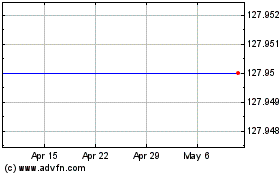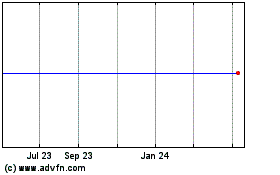Argentina Court Blocks Agrochemical Spraying Near Rural Town
March 17 2010 - 4:14PM
Dow Jones News
In a ruling bearing potentially far-reaching implications, an
appellate court in Argentina's Santa Fe province this week upheld a
decision blocking farmers from spraying agrochemicals near
populated areas.
The ruling blocks the use of chemicals such as the widely used
herbicide glyphosate within 800 meters of the town of San Jorge,
and aerial spraying within 1,500 meters of the town.
While the decision is limited to the area around San Jorge,
other courts in the farming province are likely to follow suit if
residents seek similar court action.
The court found that farmers "have been indiscriminately using
agrochemicals such as glyphosate, applied in open violation of
existing laws [causing] severe damage to the environment and to the
health and quality of life of the residents."
A backlash is building in the country against the increasing
reliance on transgenic soybeans and the herbicide widely used in
their cultivation. Soybeans dominate the country's farm output, but
growing concern over the environmental impact of
soybean-cultivation practices has spurred a legal and legislative
assault.
Last year, the Argentine Association of Environmental Lawyers
filed a case at the Supreme Court to halt the use of glyphosate,
which virtually all of the soybeans grown in Argentina have been
genetically modified to resist. Up to 200 million liters of the
herbicide are sprayed across the farm belt each season. The court
has yet to decide on whether to hear the case.
Genetically modified soybeans resistant to glyphosate were
introduced to Argentina in 1996 by St. Louis-based biotech giant
Monsanto Co. (MON). Now, with over half of all cultivated land
going to soy in the last season, virtually all of the soybeans
grown in Argentina uses Monsanto's technology. Monsanto didn't
return a call seeking comment.
The spread of the transgenic beans has led to an unprecedented
boom in farm wealth but also brought a host of ills, including soil
deterioration and wide-scale deforestation to open up new
fields.
While environmentalists have long decried the shift to soy
monoculture, opposition heated up last year when an unpublished
study conducted by the University of Buenos Aires Institute of
Cellular Biology and Neuroscience Molecular Embryology Lab found
that very low doses of glyphosate caused mutations in amphibian
embryos.
While glyphosate has been used for 30 years and is approved in
more than 100 countries, the defense minister prohibited growing
transgenic soybeans on army farms with residential compounds, in
the wake of the report. In addition, a number of local districts
have banned or limited the use of glyphosate around populated
areas, and some provinces also are debating legislation to prohibit
or limit its use.
Argentina is the world's leading exporter of soymeal and oil and
the third-largest exporter of soybeans. The legume is the country's
largest export product and a key source of export-tax revenue.
Despite criticism of the excessive reliance on soybeans from
President Cristina Fernandez, the government has encouraged the
continued shift toward soy by imposing export limits and price
controls on other goods such as wheat, corn and beef to keep local
food prices down. With virtually no domestic demand for soybeans,
their pricing and exports have been left untouched, prompting
farmers to plant more beans.
-By Shane Romig, Dow Jones Newswires; 54-11-4103-6738;
shane.romig@dowjones.com
Monsanto (NYSE:MON)
Historical Stock Chart
From Jan 2025 to Feb 2025

Monsanto (NYSE:MON)
Historical Stock Chart
From Feb 2024 to Feb 2025
